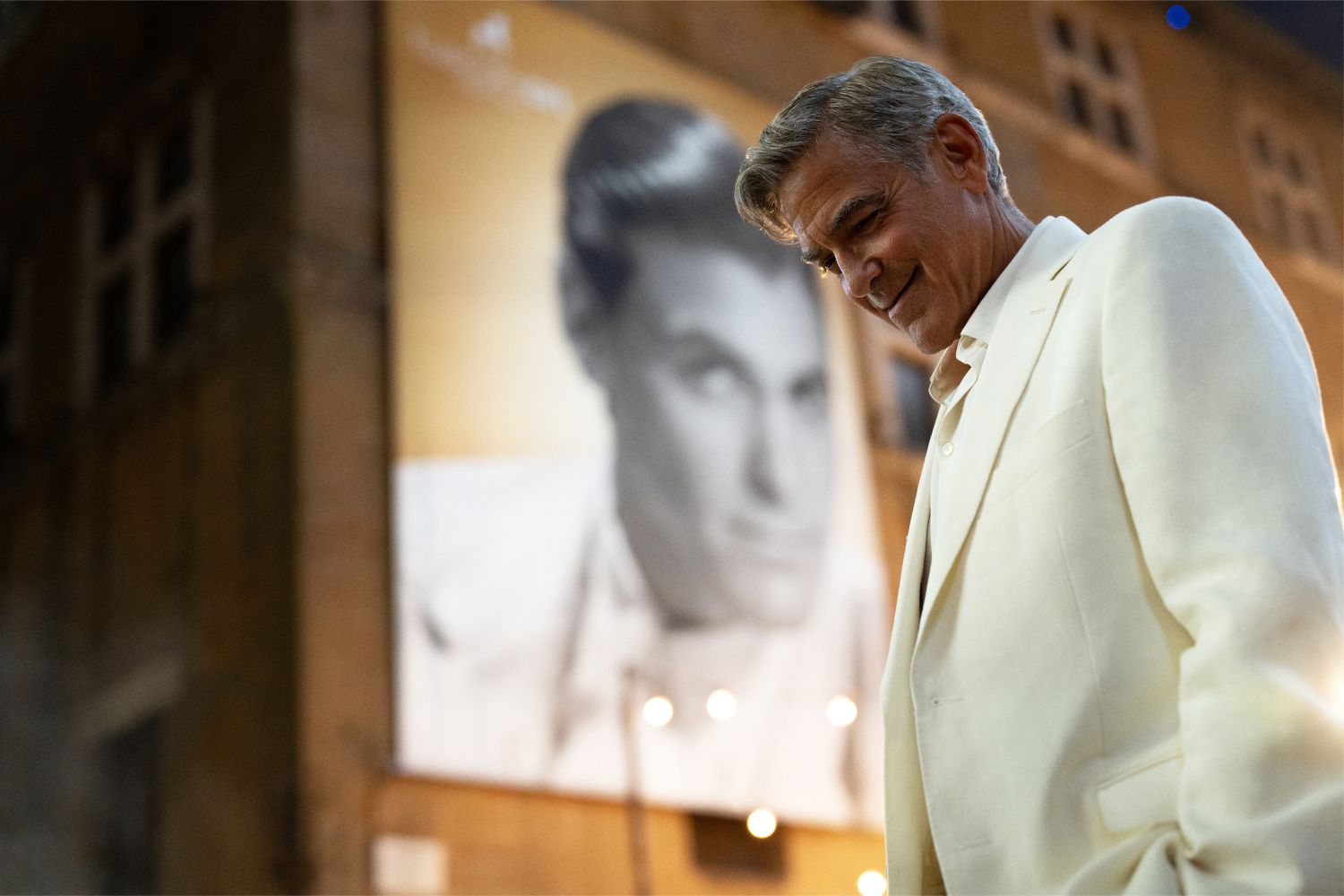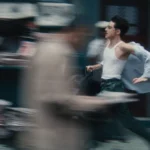George Clooney plays a parallel universe, cardboard cutout of himself in Noah Baumbach’s eponymous Jay Kelly, the fantastical tale of a world-renowned actor’s midlife crisis and his entourage’s progressive fed-upness with him. Contrary to the likes of Steven Spielberg’s The Fabelmans or Quentin Tarantino’s Once Upon A Time… in Hollywood, Jay Kelly is everything except an ode to cinema – an ode to friends and family, perhaps, to the people behind-the-scenes, maybe even to George Clooney himself, as a particularly mushy final scene seems to invoke. If anything, it’s about the sacrifices of stardom, and the impact on those who care – an enjoyable ride packed with A-listers, coming-of-age like road-trips and the odd bit of entertaining chaos, Jay Kelly nevertheless feels a little too starstruck with itself to ever go any deeper than a rushed flashback.
Perfectionist actor Jay has just wrapped up a film when he runs into old schoolmate Tim (Billy Crudup) who, after inviting him out for a drink, reveals just how much he hates him – hard not to when he stole his first big break and girlfriend all in one. Shaken up by this encounter and the death of a close friend (Jim Broadbent, who gave him said big break), Jay decides on a whim to fly to Europe and follow the path of his daughter Daisy’s (Grace Edwards) road-trip – hopefully by the end of it, he will have strengthened his bond with her and accepted a tribute award in Italy. Naturally, his entourage – devoted manager Ron (Adam Sandler) and publicist Liz (Laura Dern) – must follow, upstaging their lives in the process.
Clooney brings a great deal of empathy to the role of Jay Kelly, an archetype that has been done all too many times, a successful man, happy in appearances, but deeply lonely and regretful behind closed doors. An exchange with Crudup reveals two versions of the same man, one who “made” it and the other who didn’t – but of course, this is entirely subjective, despite Crudup’s scene-stealing mania-fuelled hate. It is a shame their characters are sworn enemies, for Jay Kelly could have done with just a little bit more of him. Sandler however is a good backup as manager-cum-father to Jay, abandoning his family mid-afternoon to fly out on his boss’ whim. Even as an experienced professional, Ron’s naivety is truly sweet, and Sandler plays him with charm and heart – it is clear he only wants what’s best for Jay, but that his commitment has blurred his boundaries over the years. Can stars and their managers be friends, when the former drags the latter away from their family at the click of his fingers? When the latter takes a fifteen percent cut? Regretfully, the conversation is left to rot for too long, and as a result, Jay Kelly feels like a drag from the two thirds point, waiting for the inevitable, but providing only filler scenes in the sultry Italian air.
Jay’s relationships to his daughters, too, feels rushed and glossed over – why, for instance, were two necessary when there isn’t even enough time to scrape the surface of a rekindling with Daisy? Conversations with Jessica (Riley Keough), the eldest who has moved away from the limelight of her father, feel nonsensical and oddly vapid – in many ways in fact, it brings to light the fact that the parent-who-abandoned-child-in-favour-of-stardom trope is timeworn and reductive. If anything, Jay Kelly is a reminder that everyone is living their life for the first time, and is bound to make mistakes (the only film to have depicted this issue with the sensitivity it deserves is Maggie Gyllenhaal’s The Lost Daughter) – if Baumbach meant to portray Jay as a bad father, then this does not come across. Rather, he is a child himself, bound to a manager who responds to his every whim, and rediscovering life for the first time – as such, there is a fairytale quality to this film, as its protagonist realises how lovely and charming people are and how wonderful a road-trip across Europe is: this is no doubt the best scene, in which he walks through a carriage of self-proclaimed “plebs”, who all bow to his feet (ironically quite a few of them are well-known faces, including Jamie Demetriou and Lars Eidinger). It feels like a scene from Paddington. Naturally, we are not duped, his publicist Liz acting as our double here, sullenly commenting that they wouldn’t be so nice if he was just a regular person, nor would the road-trip be so delightful if he didn’t have a private jet and a group of people to get him a bottle of water on demand. Of course, she doesn’t say this to his face. She and Ron have sacrificed their whole lives to a child who has sacrificed his whole life to live in fiction – and it is only now that they are processing the weight of this decision. This subplot interweaves with that of Jay in turn processing his life on the reality-fiction border, reliving the milestones that made him who he is: but in the midst of his road-trip and all the characters in between, there is very little time indeed to dedicate to a true coming-of-age. The big audition that made him a name, his love for one of his co-stars all feel like inconsequential blips. The transitions are clean cut here on Baumbach’s part, as Clooney enters a train carriage into a memory, then seamlessly exits back into the present. But, with so many subplots and relationships to delve into, there is never enough time for us to process along with Jay. In this sense, Jay Kelly film almost becomes a metaphor for Jay Kelly character: other characters become flimsy, half-drawn, while Jay continues to parade into the sunset, forever the centre of attention but never quite learning his lesson.
Jay Kelly screened at the London Film Festival.





